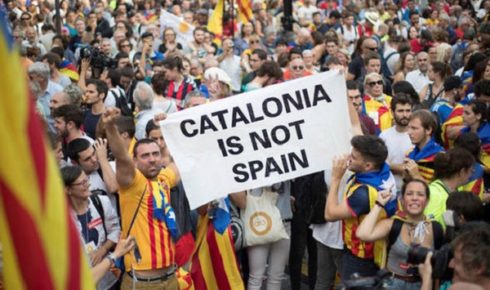On October 10th, the Spanish Foreign Minister Josep Borrell said that he cannot accuse Russia of supporting separatists leading up to the Catalan independence referendum in 2017 because there was no evidence of such meddling.
In the interview he was asked if Spain had problems similar to the ones voiced by the Netherlands and the UK. His retort was that due to lack of evidence he can provide he cannot voice any concerns.
The accusations first surfaced in November 2017 when Spain’s defense and foreign ministers said that they had evidence that state and private-sector Russian groups, as well as groups in Venezuela, used Twitter, Facebook and other Internet sites to massively publicize the separatist cause and swing public opinion behind it in the run-up to the Oct. 1 referendum. This evidence appears to either have been fabricated or never existed in the first place.
Even at that point, the Spanish Defense Minister Maria Dolores said that it is only known that a large amount of traffic came from Russian territory. Catalonia’s separatist leaders have denied that Russian interference helped them in the vote.
The foreign minister preceding Borrell, Alfonso Dastis said that Madrid was certain in the accusations and that it had “proof.”
He also said that he had raised the issue with the Kremlin. Moscow has repeatedly denied any such interference and accuses the West of a campaign to discredit Russia.
Later, January 2018, a Spanish Defense Ministry think tank the Center for Strategic and Defense Studies, CESEDEN claimed that Russian hacking operations to support Catalan independence are continuing and could intensify. A report released by the organization claimed that Russia was destabilizing Spain. “The Kremlin is taking advantage of the Catalan crisis to destabilize, employing a policy intended to generate confusion in the social media,” the report said.
In response, Russian foreign minister Sergei Lavrov has accused Spain of trying to “blame Russia for its internal weaknesses.”
According to Spain’s defense ministry, however, Russia didn’t have direct interests in Spain. It wanted to debilitate a member of NATO.
There seemed to be a loss of interest in the narrative, until May 2018, when Hans-Georg Maassen, head of the German domestic intelligence service, the BfV accused Russia of supporting the separatists in Catalonia in a bid to destabilize Spain.
According to him, it was “very plausible” that Moscow had carried out a campaign of disinformation before the secession referendum in October to encourage voters to back splitting from Spain. He did not provide other details, however he said he had reliable information from other security services.
It appears that the narrative of accusing Russia of cyber misconduct, without providing evidence has been happening for a while. It is just now beginning to pick up speed. In the Catalonia case, however, it appears that Spain’s foreign minister Josep Barrell had the common sense of not voicing unsubstantiated concerns and admitted that he would not accuse Russia due to lack of concrete evidence.






